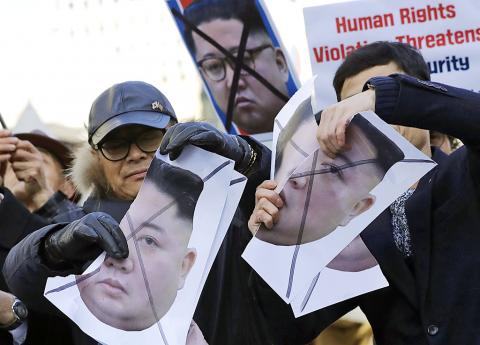About half of 451 North Korean defectors questioned in a survey endured physical violence at the hands of North Korean authorities, a rights group said yesterday, as North Korean leader Kim Jong-un prepared to meet US President Donald Trump for a summit.
On Sunday, US lawmakers called Kim the “leader of perhaps the world’s most repressive regime,” but analysts say that as in the leaders’ first summit, human rights are unlikely to be addressed in their second.
Trump and Kim are due to meet in the Vietnamese capital, Hanoi, today and tomorrow, eight months after their historic Singapore summit.

Photo: AP
On the top of their agenda is the denuclearization of the Korean Peninsula, and what concessions the US might offer in return for North Korea giving up its weapons.
North Korea’s poor human rights record is not likely to figure prominently, if at all.
The survey, conducted between 2015 and 2018 and released by Seoul-based Transitional Justice Working Group, found that three out of four North Korean defectors had, before they fled North Korea, experienced physical violence or the death of close family members, by execution or starvation, forced repatriation, arrest or detention.
About 48 percent of the respondents said that they had personally experienced violence perpetrated by the North Korean authorities, including beating, torture, rape and other sexual assault.
There has been dismay that rights seem to have been relegated down the agenda in dealing with North Korea.
In Seoul, protesters yesterday tore up photographs of Kim and threw them to the ground.
“We are skeptical of the US-North Korea summit without discussing human right issues,” said Ihn Ji-yeon, a leader of the anti-North rally and a spokeswoman for the Korean Patriots Party.
British Minister of State for the Commonwealth and United Nations Tariq Ahmad on Monday told the UN Human Rights Council in Geneva, Switzerland, that human rights in North Korea had not improved.
“Despite some welcome signs on the political track, there has been no improvement in the human rights situation,” he said.
“Meeting the challenge of North Korea’s nuclear weapons and missile programs, as well as addressing other issues such as North Korea’s systemic, gross violations of human rights, is of concern to all Americans and to our allies and partners,” US senators said in a letter to Trump on Sunday.
However, South Korean Minister of Foreign Affairs Kang Kyung-wha told the Geneva council that “human rights cannot thrive in the absence of peace.”
She said that progress toward a “nuclear-free Korean Peninsula,” which had started, would have enormous rewards, including an improvement in human rights.

Incumbent Ecuadoran President Daniel Noboa on Sunday claimed a runaway victory in the nation’s presidential election, after voters endorsed the young leader’s “iron fist” approach to rampant cartel violence. With more than 90 percent of the votes counted, the National Election Council said Noboa had an unassailable 12-point lead over his leftist rival Luisa Gonzalez. Official results showed Noboa with 56 percent of the vote, against Gonzalez’s 44 percent — a far bigger winning margin than expected after a virtual tie in the first round. Speaking to jubilant supporters in his hometown of Olon, the 37-year-old president claimed a “historic victory.” “A huge hug

Two Belgian teenagers on Tuesday were charged with wildlife piracy after they were found with thousands of ants packed in test tubes in what Kenyan authorities said was part of a trend in trafficking smaller and lesser-known species. Lornoy David and Seppe Lodewijckx, two 19-year-olds who were arrested on April 5 with 5,000 ants at a guest house, appeared distraught during their appearance before a magistrate in Nairobi and were comforted in the courtroom by relatives. They told the magistrate that they were collecting the ants for fun and did not know that it was illegal. In a separate criminal case, Kenyan Dennis

A judge in Bangladesh issued an arrest warrant for the British member of parliament and former British economic secretary to the treasury Tulip Siddiq, who is a niece of former Bangladeshi prime minister Sheikh Hasina, who was ousted in August last year in a mass uprising that ended her 15-year rule. The Bangladeshi Anti-Corruption Commission has been investigating allegations against Siddiq that she and her family members, including Hasina, illegally received land in a state-owned township project near Dhaka, the capital. Senior Special Judge of Dhaka Metropolitan Zakir Hossain passed the order on Sunday, after considering charges in three separate cases filed

APPORTIONING BLAME: The US president said that there were ‘millions of people dead because of three people’ — Vladimir Putin, Joe Biden and Volodymyr Zelenskiy US President Donald Trump on Monday resumed his attempts to blame Ukrainian President Volodymyr Zelenskiy for Russia’s invasion, falsely accusing him of responsibility for “millions” of deaths. Trump — who had a blazing public row in the Oval Office with Zelenskiy six weeks ago — said the Ukranian shared the blame with Russian President Vladimir Putin, who ordered the February 2022 invasion, and then-US president Joe Biden. Trump told reporters that there were “millions of people dead because of three people.” “Let’s say Putin No. 1, but let’s say Biden, who had no idea what the hell he was doing, No. 2, and